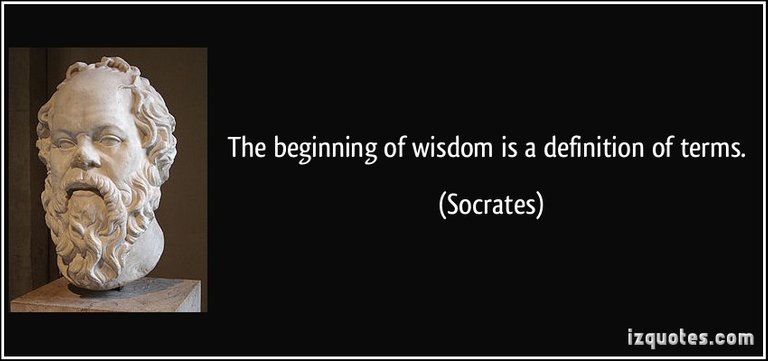These are my musings as a response to
“LIBERTY THROUGH LANGUAGE” a post by
@steeminganarchy
Please go here and upvote:
An excellent subject, and one that needs much more
discussion.
I have seen a few posts on the use of language in the
manipulation of the mind. I have made a few myself. Most
who are familiar with the concept learned of it by reading
George Orwell, in the form of 'newspeak'. In fact this goes
back thousands of years and may go back to the origins of
language itself.
Socrates is reported to have said,
If we do not know the meanings of the words we speak,
this will profoundly influence our ability, or lack thereof,
to think with accuracy in relation to objective reality of the
natural world.
One of my favorites to point out is the word 'spell'.
'Spelling' is used to create the words used to inform or
manipulate. If intellectual self defense is not, or cannot
be employed, the mind cannot find the truth of the matter.
Those 'under a spell' are easily manipulated (see hypnosis
and neurolinguistic programming)
Ericksonian Language Patterns
Origin
I also have a, not proved yet, suspicion that sarcasm was
a deliberate invention or found mechanism, injected into
culture, designed to introduce conflict in the human mind,
dividing the mind against itself to make people easier to
control. Fiction and sarcasm are 'stating that which is not',
which is indistinguishable from lying. Deception, deliberate
or not, is still deception, and causes incorrect thinking, as
the subconscious takes input at face value, which leads to
incorrect action, and can not lead to other than violation
of natural rights.
This appears to be a variation on the effect known as the
'Conman's dilemma', in which the conman falls for his/her
own manipulation.
I came to this conclusion after doing a series of
experiments with sarcasm, one of which was to use 100%
sarcasm all the time, every time for a period of weeks. The
temporary results were, increased difficulty in following
logical lines of reasoned thinking, difficulty in decision
making, and, weirdly, increased clumsiness.
I have had a long love affair with sarcasm, and was
disturbed and saddened to realize that I would need to
limit it's use.
There are historical examples of the criminalization of
'stating that which is not'. China, recently and historically,
has outlawed fiction, sarcasm, and slang for various
reasons. Recently, I think this was done to facilitate state
control in the form of primitive A.I. keyword monitoring
of the population's communications. Historically it is, so
far, unclear as to reason or purpose. It is conceivable that
it was done for the benefit of the minds of the people, but
historically, this is a vanishingly rare occurrence, and was
more likely used as a mode of control.
I find that, of the people I interact with in 'meatspace',
among those more fascinated by fiction are those less
likely to be informed about the world and the way that it
works. This is not true across the board and should not be
taken as such. Some of the most intelligent and informed
people I know use fiction as relaxation and entertainment,
but others can become obsessed, to the exclusion of
genuine knowledge and lose the distinction between
fiction and reality.
Again, I implore you, go here and upvote. This was the
impetus for the post you see before you:



good video and excellent post
Very interesting experiment you did with sarcasm. It's interesting to think about when sarcasm started. Is it a fairly recent phenomenon, or have humans always had that ability on some level?
The origin of the word appears to go back to the Greek, 'sarkasmos' from 'from 'sarkazein' to tear flesh. The origin of the concept may go further back.
I often wonder if the first sarcastic person may have been burned as a witch.
Here is a paper that, humorously enough, discusses the contradictory thought about sarcasm.
https://nerhd.files.wordpress.com/2013/06/pdf.pdf